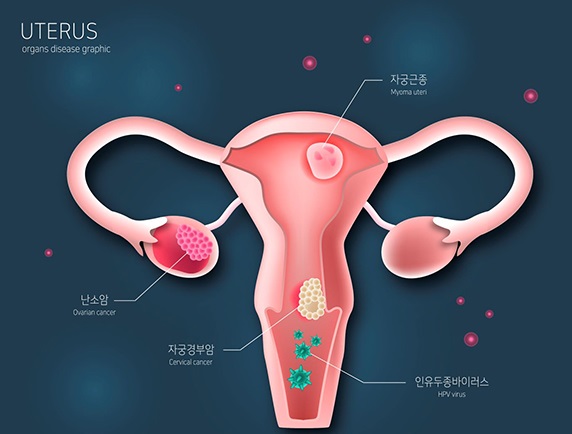I’ll give you signs and symptoms of endometrial cancer.

Early detection check
Early detection refers to testing whether a person with no symptoms of a disease such as cancer has the disease 비아그라판매
Women at risk of developing endometrial cancer at a general level
Currently, the risk of endometrial cancer is at a general level and there is no cancer screening method for women who do not have symptoms yet to see if they have endometrial cancer.
The US Cancer Society strongly recommends that all women in menopause be aware of the risk factors and symptoms of endometrial cancer and notify their doctors if they have bleeding, secretions or bloodstains.
Women should consult their doctor for regular pelvic examinations. Pelvic examinations can detect some cancers, including some advanced uterine cancer, but they are not very effective in detecting endometrial cancer early.
In some cases, early endometrial cancer is found in pep tests used for cervical cancer screening. But this is not a good way to check for endometrial cancer.
Women at High Risk of Endometrial Cancer
The American Cancer Society recommends that women at high risk of endometrial cancer should be aware of the risks and see a doctor whenever there is any abnormal bleeding. The risk of endometrial cancer increases with age, late menopause, no childbirth experience, infertility, obesity, diabetes, high blood pressure, estrogen therapy, and tamoxifen therapy.
Women with or are at high risk of developing endometrial cancer (HNPCC, called Lynch syndrome) with genetic cost-specific colorectal cancer. If you have multiple patients with colon cancer or endometrial cancer in your family, it is recommended that your family undergo genetic counseling on the risk of developing HNPCC.
If you or a close relative have been tested for heredity and one of the HNPCC genes is found to have a mutation, the risk of endometrial cancer is high.
The American Cancer Society says women with or with HNPCC should undergo endometrial biopsy every year from the age of 35. The doctor will tell you about the risks, benefits, and limitations of this test. The tests include women known to have HNPCC-related genetic mutations, women who are likely to develop such mutations (women with such mutations in their families), and women who are likely to develop colorectal cancer in their families, but have not undergone genetic testing.
Another option for women with (or potential) HNPCC is to undergo a hysterectomy once they have given birth.
Signs and symptoms of endometrial cancer
There are several symptoms of endometrial cancer, but some are more common as the cancer progresses.
Abnormal bleeding, bloodstains, or secretions
About 90% of women diagnosed with endometrial cancer have abnormal bleeding between menstrual periods or after menopause. Of course, this kind of bleeding can occur even in non-cancer situations. However, it is important to inform the doctor of abnormal bleeding immediately. If you are already in menopause, it is especially important to let your doctor know when you have abnormal bleeding, blood or secretions.
Unmixed secretions can also be a sign of endometrial cancer. Even if there is no blood in the secretion, it does not mean that it is not cancer. About 10% of the endometrial cancer-related secretions showed no blood. If you have any abnormal secretions, you should see a doctor.
Pelvic pain, mungling, weight loss.
Pelvic pain, clotting (tumor), and unintended weight loss can be symptoms of endometrial cancer. These symptoms are more common in the later stages of endometrial cancer. Even with these symptoms, endometrial cancer will progress further if medical help is delayed. And this lowers the probability of treatment.
Although these symptoms may occur for other reasons than cancer, it is important to have a doctor’s checkup if you have such symptoms.